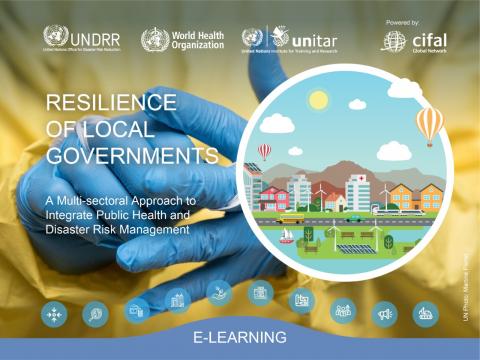
UNITAR Online Catalogue
Resilience of Local Governments: A multi-sectoral approach to integrate public health and disaster risk management

Population
United Nations Office for Disaster Risk Reduction (UNDRR), Global Education and Training Institute (GETI), World Health Organization (WHO)
Arrière plan
All communities are at risk of emergencies and disasters, including those associated with natural hazards, infectious disease outbreaks, conflicts, technological and other hazards. Particularly in the context of increased urbanization and climate change, frequency, severity and impact of those events are crucial. The health, economic, political and societal consequences of these hazards can be devastating for developed and developing countries.
Currently, countries face the COVID-19 pandemic with millions of cases and thousands of deaths confirmed worldwide, demonstrating the profound impact that pandemics have for public health systems and for other systems within the city/country. The COVID-19 pandemic is an example of the need for a comprehensive resilience and risk reduction plan that involves all sectors and actors in society.
In line with the Sendai Framework for Disaster Risk Reduction 2015-2030, SDG 11.B and SDG 3.D, this e-Learning Course offered by the United Nations Office for Disaster Risk Reduction (UNDRR) and its Global Education and Training Institute (GETI), the World Health Organization (WHO) and the United Nations Institute for Training and Research (UNITAR) aims to contribute to strengthening the capacity of local government officials for risk reduction and resilience planning inclusive of health threats management.
In view of current and emerging risks to public health and the need for more effective coordination and management of resources, this course presents two frameworks that provide guidance on how to integrate public health systems and disaster risk management:
- UNDRR’s Disaster Resilience Scorecard for Cities: Public Health System Resilience - Addendum Consultative Version 2.0 aims to serve as a tool to strengthen the local governance resilience by ensuring that public health issues are taken into consideration when planning for disaster risk reduction/resilience.
- WHO’s Health Emergency and Disaster Risk Management Framework (Health EDRM) provides a comprehensive approach that can be applied by all actors in health and other sectors who are working to reduce health risks and consequences of emergencies and disasters, and build the resilience of health systems, communities and countries.
Objectifs de l'événement
In line with the Sendai Framework for Disaster Risk Reduction 2015-2030, SDG 11.B and SDG 3.D, this e-Learning Course aims to contribute to strengthening the capacity of local government officials for risk reduction and resilience planning inclusive of health threats management.
Objectifs d'apprentissage
At the end of each module, participants will be able to:
Module 1:
- Recognize the Disaster Resilience Scorecard for Cities;
- Recognize and utilize the Public Health Addendum as a supplement to UNDRR’s Disaster Resilience Scorecard for Cities developed to help address the public health implications of major disasters.
Module 2:
- Identify policy considerations to reduce risks and consequences of emergencies and disasters;
- Recognize concepts, guiding principles, components and functions of effective Health EDRM.
Module 3:
- Utilize the Disaster Resilience Scorecard for Cities: Public Health System Resilience Addendum Consultative Version 2.0 as a tool to strengthen and integrate coverage of the many aspects of public health that are relevant to disaster planning, mitigation and response, helping to ensure the integration of public health issues in disaster risk management.
Contenu et structure
The e-Learning Course is comprised of 3 modules that can be covered over the period of two weeks:
Module 1: Introduction to UNDRR’s Disaster Resilience Scorecard for Cities and to the Public Health System Resilience - Addendum Consultative Version 2.0.
Module 2: Introduction to WHO’s Health Emergency and Disaster Risk Management Framework.
Module 3: Overview of the Disaster Resilience Scorecard for Cities: Public Health System Resilience – Addendum Consultative Version 2.0
Audience visée
- Government officials
- Health professionals
- Disaster management professionals
- Academic and training institutions working on disaster risk management
Informations supplémentaires
- To participate in the course, register here:
www.unitar.org/event/full-catalog/public-health-system-resilience-score…
- UNDRR- Address:
4F G-Tower, 175 Art Center Dae-ro,
Yeonsu-Gu, Incheon 22004, Republic of Korea
www.undrr.org I www.preventionweb.net